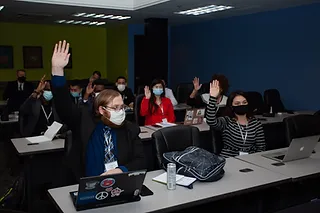Trending
- April 25, 2025
Debate in the House Friday, March 4

On Friday night the House debated a number of bills and surrounding issues, including Voter ID and vaccine mandates for college students.
HB2445 would require all people who intend to vote in Illinois to have a valid Photo ID or a provisional ballot to cast a vote in elections. While Republicans see this bill as a necessary step to ensuring secure elections, Democrats see this bill as potentially discriminatory, and argued that many people do not have the time or money to pursue a Voter Identification Card or even the documentation required to apply for one, with 21,000,000 people nationwide not possessing any form of photo ID. Democrats were also concerned this would lead to low voter turnout, with Madeeha Syed (D. Benedictine University) stating that in states where Voter ID’s are required, total votes cast went down by 2-3%.
Republicans argued that Photo IDs were a simple way for businesses and the government to verify someone’s identity and proficiency. Minority Charlie Hoffman (R. Principia College) said that acceptable forms of photo identification could be obtained at nearly 30 locations within close proximity of the Simulation, and many had free forms of public transport within walking distance of them. Minority Delaney Gatine (R. Principia College) said, “any form of voter fraud, even one instance, is unacceptable in this state.”
In order to pass, HB2445 required 16 votes supporting it. It did not pass, with 19 against it and 12 in favor.
HB4106 would make it illegal for colleges and universities to require a COVID-19 vaccination or proof of vaccination in order to enroll in any of its programs. Majority Democrats said that the bill would be detrimental to the health of students and civilians across the state, as the virus is more transmissible among unvaccinated people. Minority Republicans were adamant that it was an issue of body autonomy, and the right of college students to choose what medical procedures and treatments they wished to undergo.
Democrats confronted the issue by saying this medical procedure was not a choice of the individual; rather, it had been made for individuals by the government for the good of society, to end the spread of COVID-19. Representative Sarah Ware (D. Governors State University) also addressed students weary of the vaccine, stating that most people couldn’t define why they were hesitant to be vaccinated, and couldn’t name any chemical differences between the Covid vaccines manufactured by Moderna, Pfizer, or Johnson & Johnson and the measles vaccine.
Republicans were quick to remind the assembly that they were not against the vaccine. Instead, Republicans were concerned about the autonomy of students to choose what procedures they underwent in order to pursue higher education. Minority Whips even managed to get a Democrat across the aisle to speak out in support of the bill. The falling enrollment in Illinois colleges and universities and the mass migration out of Illinois were examples the Republicans cited of discontent among students towards vaccination mandates. Vaccine hesitancy was a reasonable position for students to hold, maintained Minority Burgens, due to the history of immoral medical experiments carried out on unsuspecting groups such as the The Tuskegee Study of Untreated Syphilis in black men.
In order to pass, HB4106 required 16 votes supporting it. It did not pass, with 14 delegates in favor and 18 delegates against.
Not every issue on the floor was highly contentious. HB3454 would have prescribers offer recovering drug addicts naloxone hydrochloride as a remedy for opioid depression. Amongst medical jargon, Democrats supposed this bill would help reduce overdoses. Republicans agreed, and the bill was quickly put to a vote.
The bill was passed unanimously, and applause was heard.
By: Tamas Dilorenzo
© 2023, www.modelilgov.org/. All rights reserved/HOME/privacy-policy/ sitemap